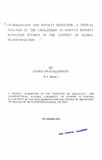| dc.description.abstract | While the government of Kenya took charge of, and dominated planning, funding and
overall poverty reduction efforts including employment in the years before 1980, the
last two decades have witnessed Kenya's increased integration into the global
economy and policy making. The changes have provided opportunities for poor
Kenyans to benefit from, but they have also entailed risks. These are the challenges
the study set out to investigate.The study finds that while the opemng up of the world economy offers great opportunities for trading the poor out of poverty a number of trends coming via the WB, IMF and WTO policies continue to condemn more to poverty. These have ensured that the global structure and economic practice in which poor countries and people start at a disadvantage is perpetuated. The backing they get from rich
governments and MNCs ensures retention of the status quo, and as the gap between
rhetoric and action grows, so does that between the rich and the poor. This is evident,
for example, in agriculture, trade in small manufactures, rural development,
employment, social services and gender imbalances.The study will assist in identifying the gaps in the basic neo-liberal faith in economics and the market mechanism for both policy makers and academicians.Despite the challenges highlighted the study steers clear of recommending isolationism. As a reality Kenya must live with globalisation. Recommended therefore are ways to make grassroots, national and global leadership and governance work best for the poor. Without these, the study contends that amidst global transformation there is little prospect in poverty reduction in the foreseeable future. | en |

